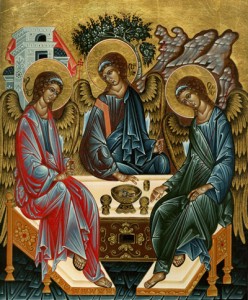 Hospitality is an ancient virtue. In other readings, we heard of Abraham being hospitable to the three angels in the desert. There are stories of the desert Fathers, among them Anthony of Egypt and Mary Magdalene who considered hospitality critical to human and divine living. Monastics through the centuries, even today, practice this noble virtue for all who enter their house. For them, the guest is seen as the icon of Christ through which they can communicate with the Trinity and receive grace.
Hospitality is an ancient virtue. In other readings, we heard of Abraham being hospitable to the three angels in the desert. There are stories of the desert Fathers, among them Anthony of Egypt and Mary Magdalene who considered hospitality critical to human and divine living. Monastics through the centuries, even today, practice this noble virtue for all who enter their house. For them, the guest is seen as the icon of Christ through which they can communicate with the Trinity and receive grace.
Elijah, the great prophet in our first reading is given hospitality by his friends. He rewards their virtue with the sacrament of children. Matthew echoes the words of Jesus Himself who said: “Whoever receives you receives me and whoever receives me receives the one who sent me.”
Even our family dinner table is a sacrament of grace for our spouse and for our children and our guests; moments when we can share our deepest thoughts and experiences, share our sorrow as well as our joy.
The Altar of Sacrifice is where we meet God Himself. We offer to Him the simplicity of Bread and Wine. He offers us the Body, Blood, Soul and Divinity of His Son, sacrificed for our redemption.
It is the offering itself that leads to grace. It is the giving up that helps us in our common call to holiness. Hospitality then is very much a part of our Catholic lives. Like all the virtues it needs to be practiced and perfected if we care to achieve our goal in life, which is heaven. Look to your family dinners. Ask yourself how well you treat even the most seemingly insignificant guest to your home:
“Whoever gives a cup of cold water to one of these little ones to drink…he will surely not lose his reward.”